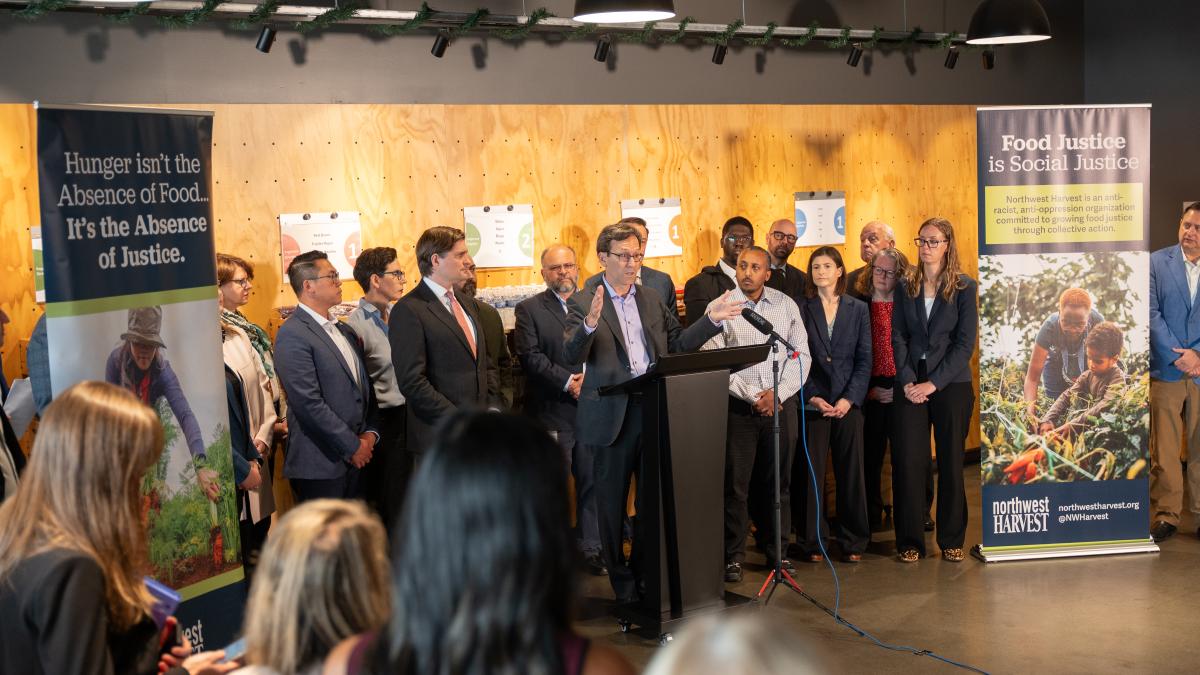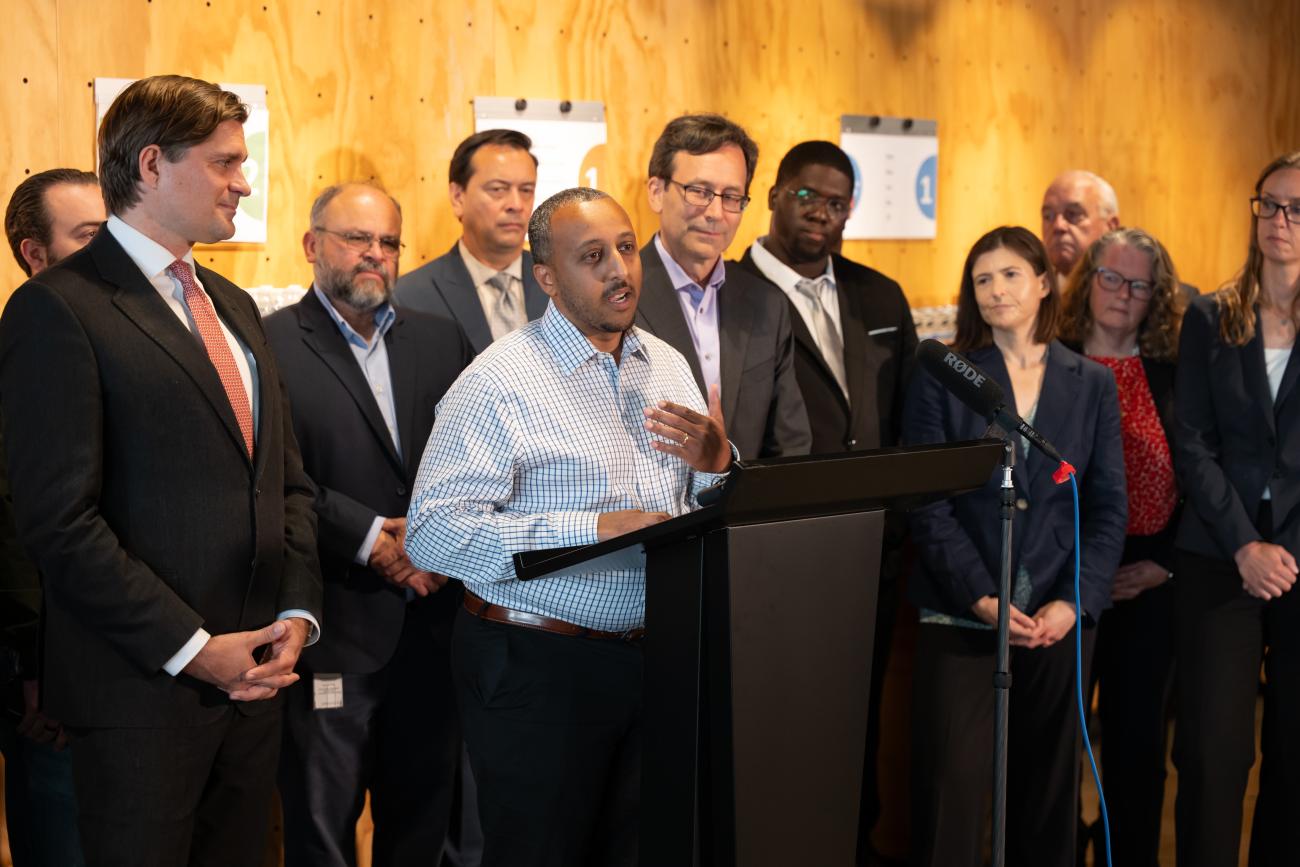
Nonpartisan report also projects rising prices and about 31,900 fewer jobs by 2029 in Washington
OLYMPIA — Governor Bob Ferguson held a press conference today to detail the Washington State Office of Financial Management’s stand-alone, nonpartisan analysis of the potential effects of the 2025 Trump tariff actions on Washington families, employers, and the state budget. To our knowledge, this is the first statewide, nonpartisan report that specifically models the effects on household prices, industries, growth, and state revenues.
The analysis, released today, found that full implementation of President Trump’s proposed tariffs will result in significantly higher costs for Washington families, as well as the loss of tens of thousands of jobs and billions of dollars in state revenue over the next four years.
“The Trump Administration’s chaotic tariff implementation is already wreaking havoc on Washington’s economy and our businesses’ ability to plan for the future,” Governor Bob Ferguson said. “This report makes it clear: The full implementation of President Trump’s tariffs will be devastating for Washington state families, businesses and our state budget.”
“This report gives us a range of scenarios of how U.S. tariffs and retaliatory tariffs could impact the state's economy and future budgets,” said OFM Director K.D. Chapman-See. “It helps us see which industries could be affected, and where support for Washington families and businesses might be needed.”
“Tariffs are a regressive tax that disproportionately burden low-income households,” said Thomas Reynolds, CEO of Northwest Harvest. “At a time when federal food assistance programs are shifting and grocery affordability is increasingly out of reach, leadership across sectors must come together to ensure everyone has enough to eat. At Northwest Harvest, we’re working to get essential food to every county in Washington—and we see firsthand how Governor Ferguson is standing up for communities by spotlighting how tariffs deepen food insecurity.”
Key findings
The OFM report projects the impacts to Washington if President Trump’s “Liberation Day” tariffs are fully implemented and maintained through 2029. This would create an average or “effective” tariff rate of 27 percent. Under that scenario, Washingtonians will see:
- Higher prices for food. Groceries face near-term increases, resulting in 16% higher prices cumulatively over two years.
- Higher prices for clothes and shoes. Clothing and footwear prices are projected to rise around 7% in one year and then ease.
- Higher prices for cars. Used car prices are projected to rise about 20–25% over two years. New cars are projected to rise 6–8%.
- Tens of thousands of jobs at risk. Washington will lose about 31,900 jobs by 2029, with agriculture, food processing, and aerospace the hardest hit.
- Less revenue for public services. Based on the model’s assumptions, weaker sales and business activity could lead to a loss of $2.2 billion in general fund revenue to the state by 2029.
- Slower growth. Quarterly state GDP growth is 1.2 to 1.8 percentage points lower through 2029.
OFM also ran a projection with the tariffs in effect as of Aug. 7. That effective rate is more than 18 percent — the highest since 1933. If those were extended through 2029, would also experience significant adverse impacts. For example, Washington stands to lose 20,000 to 25,000 jobs.
Governor Ferguson action on tariffs
In May, Governor Ferguson led a coalition of 24 public and private partners, including state and local officials, state legislators, labor unions, and business and economic development interests, to file a “friend of the court” brief in support of the federal multistate lawsuit to block President Trump’s illegal tariffs
Last Friday, a federal court of appeals agreed with the coalition and struck down the illegal tariffs — but the court let the tariffs remain in effect for now to give the Trump Administration time to appeal to the United States Supreme Court. Trump filed that appeal yesterday. If the Supreme Court accepts the appeal, the tariffs will remain in effect until the justices decide the case.
Ferguson’s amicus brief states: “If allowed to remain in effect, the President’s tariffs will continue to wreak havoc on Washington-based interests by disrupting established supply chains, forcing businesses and consumers to pay more for goods, equipment, and services, and interfering with the Governor’s ability to shape and implement a state budget and pursue state policy priorities amid the significant uncertainty, chaos, and adverse economic conditions caused by the tariffs.”
How the state will use the report
The Governor’s Office and OFM are using this analysis to guide careful budgeting that protects core services, and targets support to the communities and sectors most exposed to trade shocks. State agencies are coordinating with ports, growers, manufacturers, and small businesses to manage supply and market-access challenges. They are also elevating requests for federal flexibility where warranted. OFM will keep the public informed with updated numbers and plain-language explainers as conditions change.
Access the report and materials
About the Office of Financial Management (OFM)
The Office of Financial Management provides budget, policy, and data services that help the Governor, Legislature, and state agencies serve the people of Washington. OFM develops the Governor’s budget, supports statewide performance and results, and publishes independent analysis to inform public decision-making. Learn more at ofm.wa.gov.
About the Forecasting and Research Division
OFM’s Forecasting and Research Division produces independent economic, demographic, and policy analysis for Washington. The division develops official state population estimates and projections, supports the state’s revenue and caseload forecasts, and publishes research on the economy, health care, education, public safety, and other issues that affect communities across the state.



